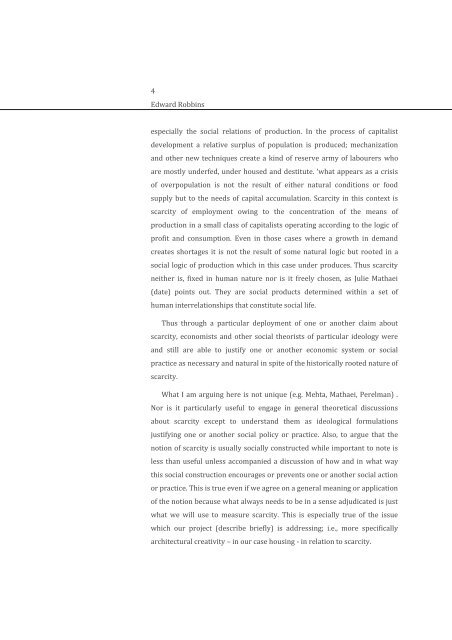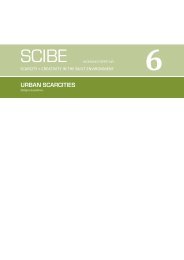SOME THOUGHTS ABOUT SCARCITY - SCIBE
SOME THOUGHTS ABOUT SCARCITY - SCIBE
SOME THOUGHTS ABOUT SCARCITY - SCIBE
You also want an ePaper? Increase the reach of your titles
YUMPU automatically turns print PDFs into web optimized ePapers that Google loves.
4<br />
Edward Robbins<br />
especially the social relations of production. In the process of capitalist<br />
development a relative surplus of population is produced; mechanization<br />
and other new techniques create a kind of reserve army of labourers who<br />
are mostly underfed, under housed and destitute. ‘what appears as a crisis<br />
of overpopulation is not the result of either natural conditions or food<br />
supply but to the needs of capital accumulation. Scarcity in this context is<br />
scarcity of employment owing to the concentration of the means of<br />
production in a small class of capitalists operating according to the logic of<br />
profit and consumption. Even in those cases where a growth in demand<br />
creates shortages it is not the result of some natural logic but rooted in a<br />
social logic of production which in this case under produces. Thus scarcity<br />
neither is, fixed in human nature nor is it freely chosen, as Julie Mathaei<br />
(date) points out. They are social products determined within a set of<br />
human interrelationships that constitute social life.<br />
Thus through a particular deployment of one or another claim about<br />
scarcity, economists and other social theorists of particular ideology were<br />
and still are able to justify one or another economic system or social<br />
practice as necessary and natural in spite of the historically rooted nature of<br />
scarcity.<br />
What I am arguing here is not unique (e.g. Mehta, Mathaei, Perelman) .<br />
Nor is it particularly useful to engage in general theoretical discussions<br />
about scarcity except to understand them as ideological formulations<br />
justifying one or another social policy or practice. Also, to argue that the<br />
notion of scarcity is usually socially constructed while important to note is<br />
less than useful unless accompanied a discussion of how and in what way<br />
this social construction encourages or prevents one or another social action<br />
or practice. This is true even if we agree on a general meaning or application<br />
of the notion because what always needs to be in a sense adjudicated is just<br />
what we will use to measure scarcity. This is especially true of the issue<br />
which our project (describe briefly) is addressing; i.e., more specifically<br />
architectural creativity – in our case housing - in relation to scarcity.




